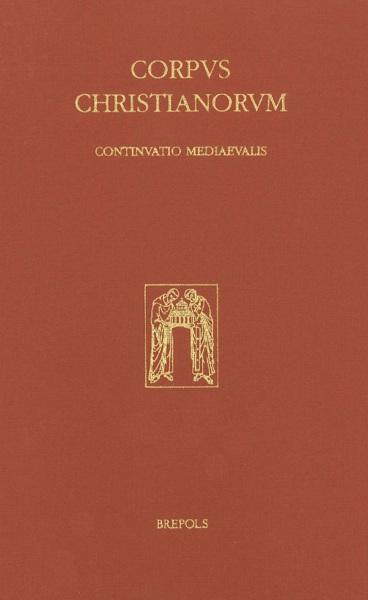
Raimundus Lullus
Opera latina XXXVIII (142-153)
anno 1309 composita
Fernando Domínguez Reboiras (ed)
- Pages: 364 p.
- Size:155 x 245 mm
- Illustrations:1 col., 8 tables b/w.
- Language(s):Latin, Spanish
- Publication Year:2018
- € 290,00 EXCL. VAT RETAIL PRICE
- ISBN: 978-2-503-55703-8
- Hardback
- Available
Critical edition of Ramon Llull's op. 142-153.
Fernando Domínguez Reboiras, now retired, worked at the Raimundus-Lullus-Institut (Albert-Ludwigs-Universität Freiburg) from 1970 till 2008. As editorial manager of the ROL series, member of the editorial board and editor of several ROL volumes he has contributed substantially to the Corpus Christianorum Continuatio Mediaevalis series. Presently he teaches at the Spanish Universidad Nacional de Educación a Distancia (UNED).
This volume contains nine treatises composed in Montpellier in the spring of 1309. At this time Lull was over 75 years of age. Several of the treatises are clearly meant to show how the principles and the method of proof presented in the recently completed Ars generalis ultima may be applied to contemporary theological problems. They are part of Lull's effort to make his work known to the theologians in Paris where he was planning to travel later that year. Lull apparently wanted to address the principal problem he would face in Paris, that is, the demonstration of the Christian doctrines of the Trinity and the Incarnation. He argued that the Saracens pay no attention to Christian theology because Christian theologians maintain that faith is not demonstrable. This is because they only recognize the two Aristotelian modes of demonstratio quia and propter quid, ignoring both Lull's demonstratio per aequiparantiam (explained in his op. 121 written in 1305) and his demonstratio per hypothesim (outlined in several works from 1308 and 1309). The treatises edited in this volume represent an attempt to propagate the knowledge of Lull's Art, while at the same time providing an example of how the demonstratio per hypothesim may be applied in divinis. In op. 146, after fresh experience and in the light of the changed political situation, Lull once more revised his ideas about the conversion of non-Christians and the conquest of the Holy Land.
Raimundus Lullus — De duodecim syllogismis concludentibus duos actus finales, unum intrinsecum, alium extrinsecum (op. 145) — ed. F. Domínguez Reboiras
Raimundus Lullus — Epistola Raimundi ad quendam praelatum consiliarium regis Francorum (op. 153) — ed. F. Domínguez Reboiras
Raimundus Lullus — Epistola Raimundi ad regem Francorum (op. 152) — ed. F. Domínguez Reboiras
Raimundus Lullus — Epistola Raimundi ad Studium Parisiense (op. 151) — ed. F. Domínguez Reboiras
Raimundus Lullus — Liber de acquisitione Terrae Sanctae (op. 146) — ed. F. Domínguez Reboiras
Raimundus Lullus — Liber de convenientia, quam habent fides et intellectus in obiecto (op. 144) — ed. F. Domínguez Reboiras
Raimundus Lullus — Liber de maiori agentia Dei (op. 143) — ed. F. Domínguez Reboiras
Raimundus Lullus — Liber de nominibus divinarum personarum seu de Trinitate et in unitate permansive in essentia Dei (op. 149) — ed. F. Domínguez Reboiras
Raimundus Lullus — Liber de potestate divinarum rationum (op. 148) — ed. F. Domínguez Reboiras
Raimundus Lullus — Liber de probatione, quod in Deo sunt tres personae (op. 150) — ed. F. Domínguez Reboiras
Raimundus Lullus — Liber de propriis et communibus actibus divinarum rationum (op. 147) — ed. F. Domínguez Reboiras





